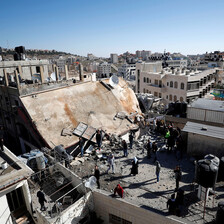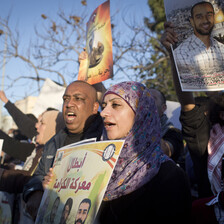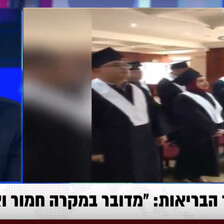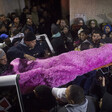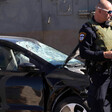The Electronic Intifada 14 December 2015
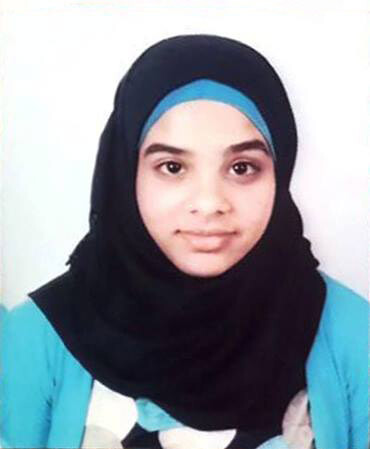
It is hard to believe that Hadil Awwad’s room has been abandoned for more than two weeks. It is clean, tidy and smells beautiful.
Teddy bears of many colors are scattered on the two sides of her bed. Hadil received them as a gift from one of her brothers when he returned from China. Even as she turned 14 she continued to keep those teddy bears in her room.
Her new jacket that she had bought recently and only wore once is hanging in the wardrobe.
She will never have a chance to wear it again.
Hadil Awwad was shot dead by Israeli forces on 23 November. She was executed after allegedly trying to stab an Israeli man with scissors on Jaffa Street in Jerusalem.
Her 16-year-old cousin Nurhan was also injured and has subsequently been charged with attempted murder.
Hadil’s mother, Maliha, does not accept Israel’s version of events. Maliha said that the scissors found on her daughter were the ones Hadeel had used in art class.
“Posed no danger at all”
The scissors were not sharp enough to be considered a lethal weapon, she said. “No one believes that she could have hurt anyone,” Maliha added. “They killed her when she posed no danger at all.”
Security video of the incident shows Hadil and her cousin being knocked to the ground and shot at close range before any attempt was made to arrest them.
The Israeli rights group B’Tselem stated that in the case of the Awwad cousins, and Ashraqat Qatnani, another Palestinian girl shot dead during an alleged stabbing incident: ”it is hard to see how the three girls committing the attacks posed mortal danger at the time they were shot. It appears that the security forces involved could have easily apprehended them without using live fire.”
Israel’s apparent shoot-to-kill policy has left approximately two dozen Palestinian children dead since what has been termed the “intifada of the knives” began more than two months ago.
Hadil is among the youngest of those children slain.
She grew up in a household with several siblings in Qalandiya refugee camp near the occupied West Bank city of Ramallah.
Her family is originally from Ishwa, a village near Jerusalem. They were forced from their homes during the Nakba, the 1948 ethnic cleansing of Palestine.
Maliha struggles to absorb the enormity of her loss. She has seen images of Hadil’s killing on Facebook but cannot bring herself to watch the video of the incident.
Hadil was a child who, when not preoccupied by her studies, loved to go shopping with her friends in Ramallah, go to amusement parks and attend activities organized by the community center in the camp.
“She wore her school uniform and was supposed to go to school in the nearby village of Kufr Aqab,” Maliha told The Electronic Intifada. “A few hours later, we saw pictures of her bleeding to death on Facebook and recognized her from the pictures.”
Bright pupil
Hadil was a bright pupil who had hoped to study medicine at university. Only two days before her killing, her biology teacher conducted an autopsy on a rabbit to show the students the different parts of the animal’s body. Hadil volunteered to assist her and was keen to examine what was inside the rabbit’s head.
“I told her that becoming a doctor is difficult and a mountain to climb, but she set her eyes on that one thing,” Maliha said. “She wanted to become a brain surgeon to understand how a tiny bullet that hit her brother in the head managed to end his life.”
Hadil’s older brother, Mahmoud, was widely admired in Qalandiya. He was one of the first men to defend their camp during any night raid by Israeli forces and was a role model for his younger sister.
In March 2013, he was shot with a rubber-coated steel bullet during confrontations with Israeli soldiers. The bullet left him clinically dead for nearly eight months.
Mahmoud was pronounced dead on 28 November that year.
His funeral was one of the largest ever seen in the camp.
“I haven’t recovered yet from losing Mahmoud,” Maliha said. “Ever since his death, I haven’t gone to any wedding or celebration.”
For Hadil, Mahmoud was a father figure particularly as she was very young when her own father died of natural causes.
Whether she was thinking of avenging Mahmoud’s killing or not, the family cannot know. Hadil left no letters and said nothing to her mother or friends.
However, it is known that she visited her brother’s grave just before she left the camp on the day of her killing, just a few days before the second anniversary of Mahmoud’s death.
Reopening a wound
Following Hadil’s slaying, her surviving brothers were summoned for interrogation by the Israeli army. Later the school bag that was on her back when she was killed was returned. Her mother cannot bear to see that bag.
“Hadil’s death reopened the wound all over again,” Maliha said. “She revived the pain of losing Mahmoud. Now when I look at their pictures hanging in the entrance to our home, I’m lost for words to describe my feelings.”
Only a week before Hadil’s execution, two young men had been killed in Qalandiya when more than a thousand Israeli troops invaded the camp to demolish the home of the Palestinian prisoner Muhammad Abu Shahin.
The two young men were Laith Manasra and Ahmad Abu al-Aish. Members of their families were among the first to visit Maliha Awwad and express their condolences for the loss of Hadil.
“In the camp when any martyr falls, families of all martyrs come to support [their loved ones],” Maliha said. “But not just people from the camp came. All of Hadil’s classmates and teachers came. They were just as shocked as I was.”
Clashes between Israeli forces and Palestinian youth have taken place on an almost daily basis since Hadil was killed. Several demonstrations demanding the return of Hadil’s body and those of other Palestinians have also been held in Qalandiya.
Maliha believes that the Israeli forces have been behaving in a highly provocative manner. They cannot expect Palestinian youth not to fight back.
While Hadil’s school bag was returned, her body is still being held by Israel.
According to the Jerusalem Legal Aid and Human Rights Center, Israel has refused to transfer the bodies of more than 50 other Palestinians killed since October to their families.
Hadil is among the 12 children whose bodies haven’t been returned.
Maliha Awwad dreamed of seeing her daughter working in the white uniform of a doctor. Now Maliha only wants to have the right of covering the young girl in a white shroud and attending her funeral.
“I want to see her and bury her,” Maliha said. “Is that too much to ask?”
Budour Youssef Hassan is a Palestinian writer and law graduate based in occupied Jerusalem. Blog: budourhassan.wordpress.com. Twitter: @Budour48
